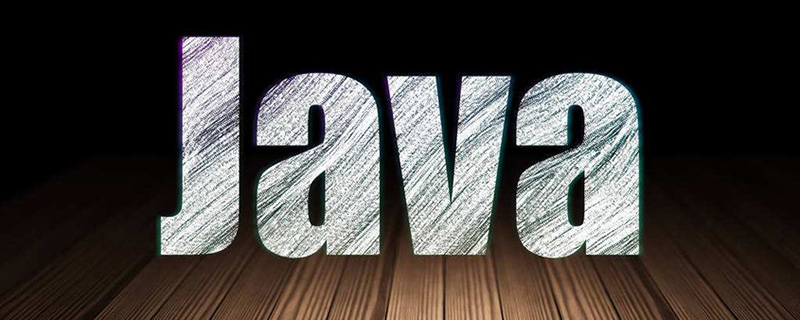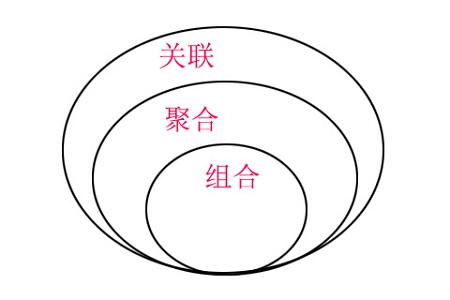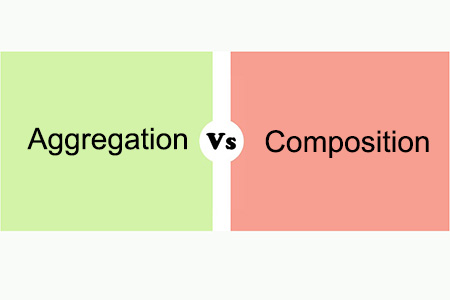What is the difference between aggregation and composition in java
The difference between aggregation and combination is: aggregation represents a has-a relationship, a one-way relationship; the two classes (or entities) in the aggregation can exist independently and will not affect each other. The combination represents a part-of relationship. The two entities (or classes) in the combination are highly dependent on each other and will affect each other.

This article will introduce to you association, aggregation and combination in Java, so that you can understand the difference between aggregation and combination. I hope it will be helpful to you. [Recommended related video tutorials: Java Tutorial]
What is the association in java?
Association is a relationship between two independent classes that can connect two completely independent entities through their objects (or instances). Associations can be of any type, one-to-one, one-to-many, many-to-one, many-to-many.
What is aggregation in java?
Aggregation is a special form of association that represents a has-a relationship; it is a one-way relationship between classes (or entities). For example: wallet and money, the wallet will contain money, but the money will not contain the wallet; this is a naturally one-way relationship.
In an aggregation relationship, two classes (or entities) can exist independently and will not affect each other; that is to say: the existence of one class (or entity) will not affect the other classes (or entities) aggregated with it. The existence or absence of the class.

What is combination in java?
A combination is a restricted form of aggregation that represents a part-of relationship; two entities (or classes) are highly dependent on each other. Just like: humans and the heart, humans need the heart to survive, and the heart also needs the human body to survive.
In other words, when classes (entities) depend on each other and their lifespan is the same (if one dies, then the other dies too), then it is a composition. For example: without humans, the heart would have no meaning.
The difference between aggregation and combination

##1. Difference in dependencies
The two classes (or entities) in an aggregation can exist independently and will not affect each other; the associated party can be independent of the associated party, and the dependence does not powerful. On the contrary, the two entities (or classes) in the combination are highly dependent on each other, and they will affect each other.2. Differences in relationship types
Aggregation represents a has-a relationship, a one-way relationship; combination represents a part-of relationship.3. Differences in association strength
Aggregation is a weak association; combination is a strong association.4. Differences in life cycles
The life cycles of the two classes (or entities) in the aggregation relationship are not synchronized; however, in the combination relationship The life cycles of two classes (or entities) are synchronized. Summary: The above is the entire content of this article, I hope it will be helpful to everyone's study.The above is the detailed content of What is the difference between aggregation and composition in java. For more information, please follow other related articles on the PHP Chinese website!

Hot AI Tools

Undresser.AI Undress
AI-powered app for creating realistic nude photos

AI Clothes Remover
Online AI tool for removing clothes from photos.

Undress AI Tool
Undress images for free

Clothoff.io
AI clothes remover

Video Face Swap
Swap faces in any video effortlessly with our completely free AI face swap tool!

Hot Article

Hot Tools

Notepad++7.3.1
Easy-to-use and free code editor

SublimeText3 Chinese version
Chinese version, very easy to use

Zend Studio 13.0.1
Powerful PHP integrated development environment

Dreamweaver CS6
Visual web development tools

SublimeText3 Mac version
God-level code editing software (SublimeText3)

Hot Topics
 1670
1670
 14
14
 1428
1428
 52
52
 1329
1329
 25
25
 1274
1274
 29
29
 1256
1256
 24
24
 PHP: A Key Language for Web Development
Apr 13, 2025 am 12:08 AM
PHP: A Key Language for Web Development
Apr 13, 2025 am 12:08 AM
PHP is a scripting language widely used on the server side, especially suitable for web development. 1.PHP can embed HTML, process HTTP requests and responses, and supports a variety of databases. 2.PHP is used to generate dynamic web content, process form data, access databases, etc., with strong community support and open source resources. 3. PHP is an interpreted language, and the execution process includes lexical analysis, grammatical analysis, compilation and execution. 4.PHP can be combined with MySQL for advanced applications such as user registration systems. 5. When debugging PHP, you can use functions such as error_reporting() and var_dump(). 6. Optimize PHP code to use caching mechanisms, optimize database queries and use built-in functions. 7
 PHP vs. Python: Understanding the Differences
Apr 11, 2025 am 12:15 AM
PHP vs. Python: Understanding the Differences
Apr 11, 2025 am 12:15 AM
PHP and Python each have their own advantages, and the choice should be based on project requirements. 1.PHP is suitable for web development, with simple syntax and high execution efficiency. 2. Python is suitable for data science and machine learning, with concise syntax and rich libraries.
 Break or return from Java 8 stream forEach?
Feb 07, 2025 pm 12:09 PM
Break or return from Java 8 stream forEach?
Feb 07, 2025 pm 12:09 PM
Java 8 introduces the Stream API, providing a powerful and expressive way to process data collections. However, a common question when using Stream is: How to break or return from a forEach operation? Traditional loops allow for early interruption or return, but Stream's forEach method does not directly support this method. This article will explain the reasons and explore alternative methods for implementing premature termination in Stream processing systems. Further reading: Java Stream API improvements Understand Stream forEach The forEach method is a terminal operation that performs one operation on each element in the Stream. Its design intention is
 PHP vs. Other Languages: A Comparison
Apr 13, 2025 am 12:19 AM
PHP vs. Other Languages: A Comparison
Apr 13, 2025 am 12:19 AM
PHP is suitable for web development, especially in rapid development and processing dynamic content, but is not good at data science and enterprise-level applications. Compared with Python, PHP has more advantages in web development, but is not as good as Python in the field of data science; compared with Java, PHP performs worse in enterprise-level applications, but is more flexible in web development; compared with JavaScript, PHP is more concise in back-end development, but is not as good as JavaScript in front-end development.
 PHP vs. Python: Core Features and Functionality
Apr 13, 2025 am 12:16 AM
PHP vs. Python: Core Features and Functionality
Apr 13, 2025 am 12:16 AM
PHP and Python each have their own advantages and are suitable for different scenarios. 1.PHP is suitable for web development and provides built-in web servers and rich function libraries. 2. Python is suitable for data science and machine learning, with concise syntax and a powerful standard library. When choosing, it should be decided based on project requirements.
 PHP's Impact: Web Development and Beyond
Apr 18, 2025 am 12:10 AM
PHP's Impact: Web Development and Beyond
Apr 18, 2025 am 12:10 AM
PHPhassignificantlyimpactedwebdevelopmentandextendsbeyondit.1)ItpowersmajorplatformslikeWordPressandexcelsindatabaseinteractions.2)PHP'sadaptabilityallowsittoscaleforlargeapplicationsusingframeworkslikeLaravel.3)Beyondweb,PHPisusedincommand-linescrip
 PHP: The Foundation of Many Websites
Apr 13, 2025 am 12:07 AM
PHP: The Foundation of Many Websites
Apr 13, 2025 am 12:07 AM
The reasons why PHP is the preferred technology stack for many websites include its ease of use, strong community support, and widespread use. 1) Easy to learn and use, suitable for beginners. 2) Have a huge developer community and rich resources. 3) Widely used in WordPress, Drupal and other platforms. 4) Integrate tightly with web servers to simplify development deployment.
 PHP vs. Python: Use Cases and Applications
Apr 17, 2025 am 12:23 AM
PHP vs. Python: Use Cases and Applications
Apr 17, 2025 am 12:23 AM
PHP is suitable for web development and content management systems, and Python is suitable for data science, machine learning and automation scripts. 1.PHP performs well in building fast and scalable websites and applications and is commonly used in CMS such as WordPress. 2. Python has performed outstandingly in the fields of data science and machine learning, with rich libraries such as NumPy and TensorFlow.




